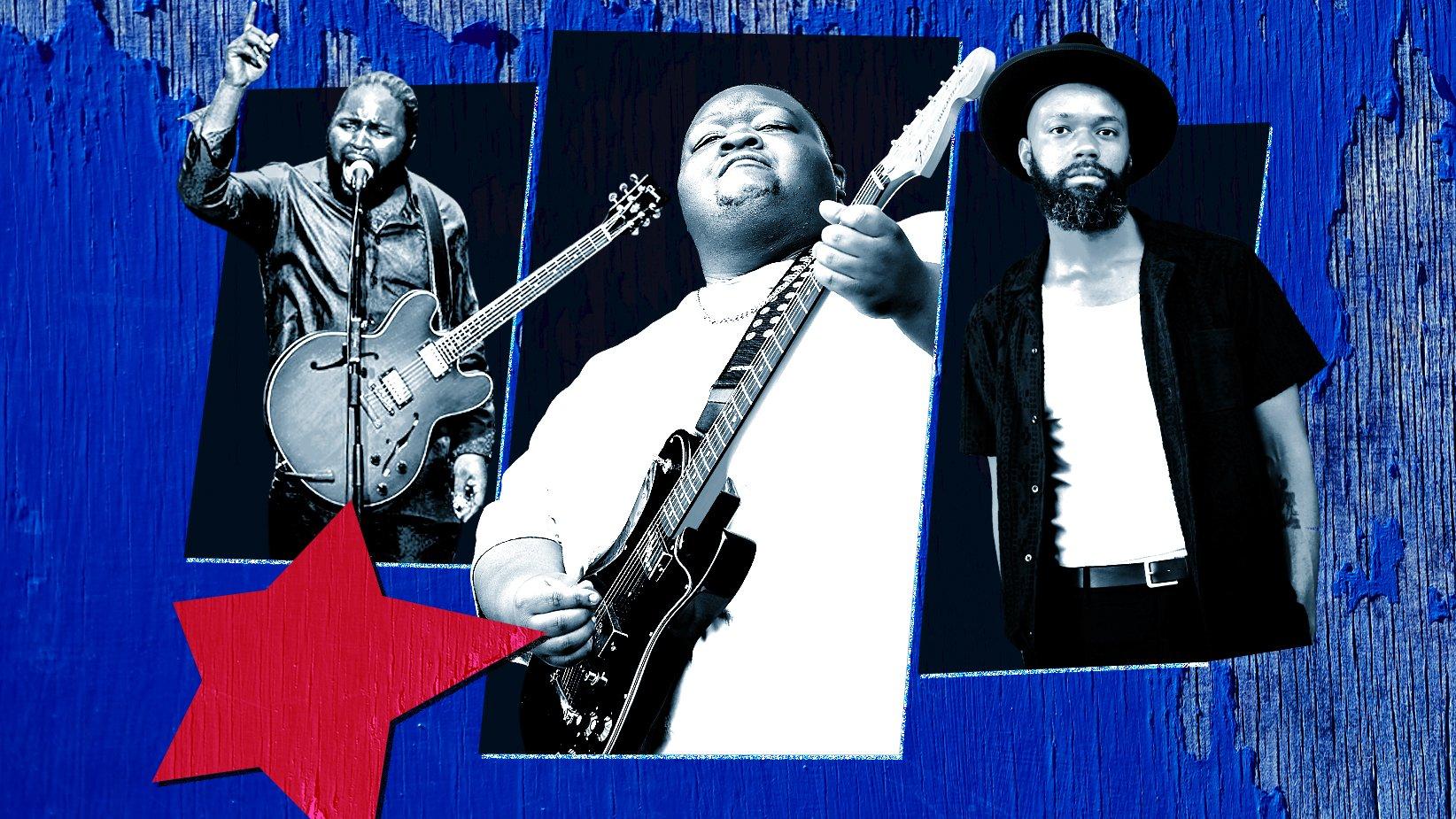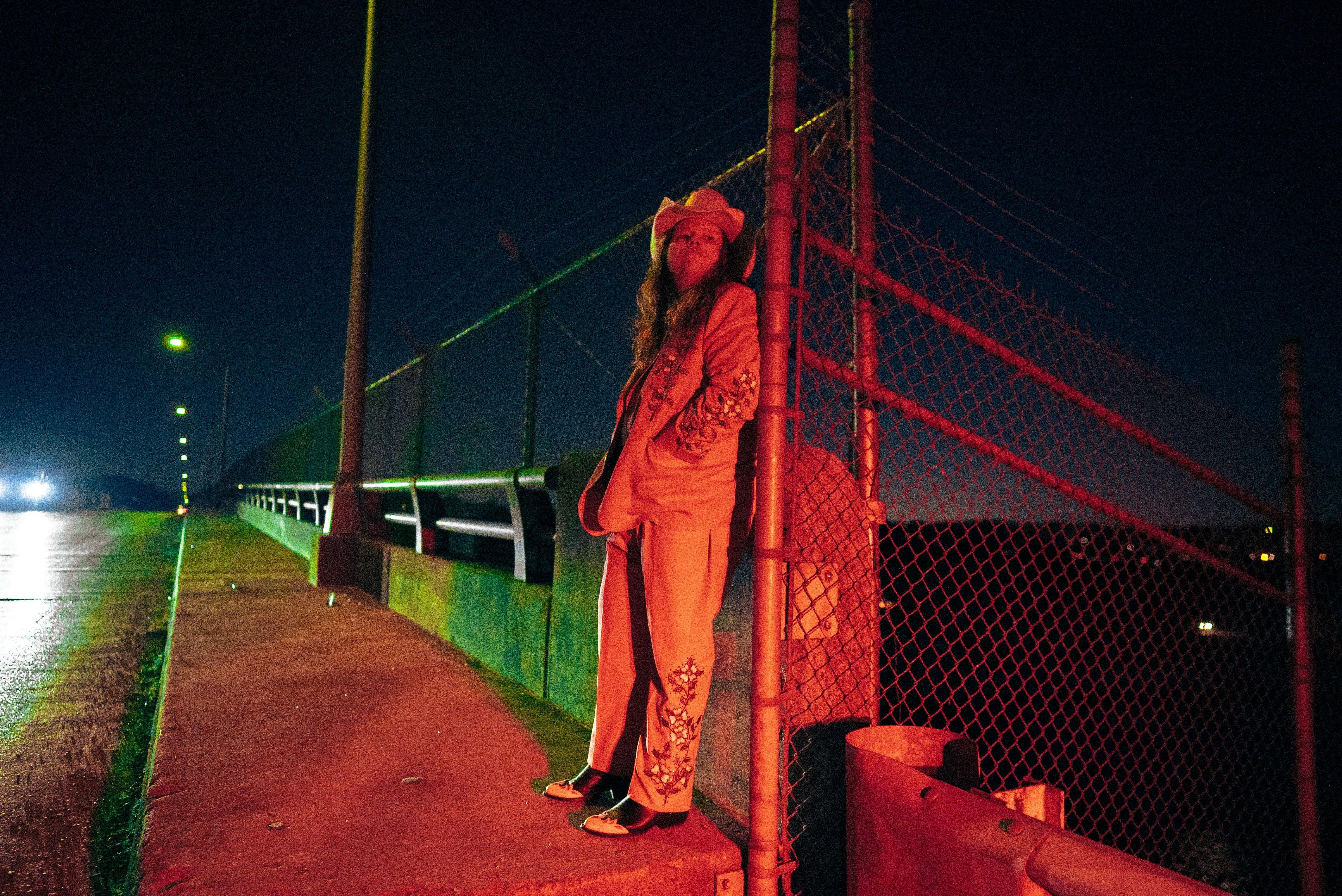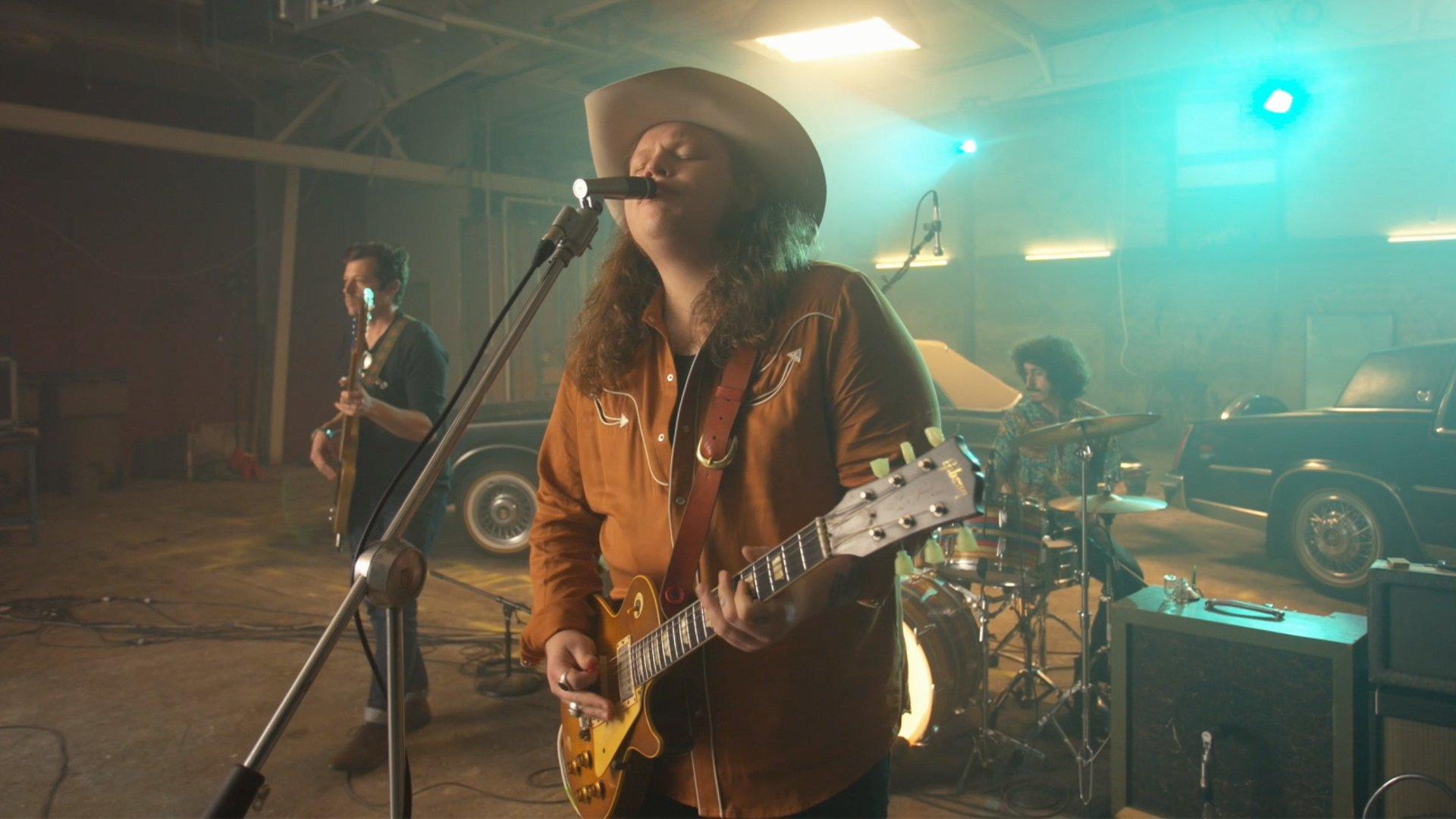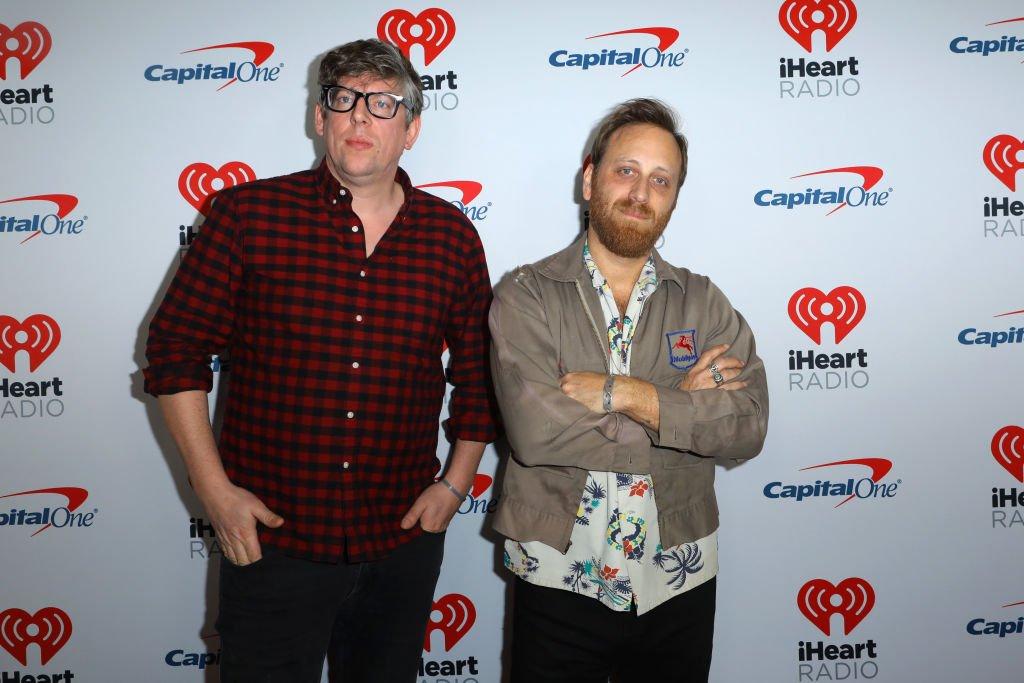Photos (L-R): courtesy of the artist, Gary Miller/WireImage via Getty Images, Samer Ghani

list
5 Younger Musicians Keeping The Blues Alive: Christone "Kingfish" Ingram, Marcus King, Buffalo Nichols & More
If the blues in the 21st century conjures suburban sports bar nightmares, it's time to wake up: these five younger bluesbreakers keep the flame burning.
Does blues-based music have a certain agelessness?
Robert Johnson, Chuck Berry, the early Beatles and Stones — all of them, and so many more — seemingly walked out of this primordial soup and flipped the world on its head. At their peak, their songs could have been written this morning.
But timelessness can be a double-edged sword. While the parameters of 12 bars has beene a launchpad for innovation and imagination, it can also stymie and bind.
Most of us know the shadow side of the issue: pentatonic scales and pitch harmonics, laboriously picked out in the suburban sports bars of America. God bless, but it's difficult to imagine that's keeping the blues alive, per se. Negative associations with the genre can even wall it off from youthful possibilities
If the utterance of the b-word conjures visions of scrunch-faced dads, let's unwind them. In the 21st century, younger folks are excellent stewards of this music; GRAMMY.com takes a quick tour through five of such bluesbreakers.
Marquise Knox
The St. Louis native has been shedding and performing since he was a pre-teen — and by hitting the ground running, he left much of his competition in the dust.
Since his early years under the tutelage of GRAMMY-winning blues great Henry James Townsend, Knox has successfully married his craggy, gravitational voice with his combustible way with an electric guitar.
At just 16 years old, Knox recorded his debut album, 2010's Man Child, with guitarist Michael Burks and his band. The album was nominated for a Blues Music Award for Best New Artist Debut, among other impressive plaudits.
In the ensuing years, Knox has released reverent yet unflinching works, including 2011's Here I Am and 2017's Black and Blue. A stabbing attack in 2017 couldn't sideline him: he's been burning it up on stages up to this very week.
"The world don't owe me nothing," Knox said the following year. "I ain't never felt no kind of privilege in this world. Mules have kicked me, but didn't damage my pride. The rattlesnake bit me, but just crawled off and died. I represent St. Louis blues like no other. I am the blues."
Marcus King
Dan Auerbach has deservedly made his biggest impression on the music industry via the Black Keys. But his production and label work with Easy Eye Sound has proven to be an equal and parallel stream — and it's allowed him to elevate young luminaries like Marcus King.
"I just feel very fortunate that I get to make records with artists that I love, and people that blow me away," Auerbach told GRAMMY.com in 2022. Which King clearly did — and then some.
The album they made together, 2022's Young Blood, is drenched in the blues, but also the music in its wake: Cream, Hendrix, Sabbath, Led Zeppelin. (With some Free, ZZ Top, and Creedence for good measure.)
Thereby, King is a bridge from pure blues to all manner of realms in the rock 'n' roll canon — smoldering psychedelia, fried Southern rock, head-shop heavy metal.
"It ended up sounding like something new to me," King told Spin. "Even though it was inspired by music I've listened to for a long time." With that in mind, let King's artistry straddle two zones: your memories, and what's coming down the pike.
Ally Venable
A native Texan, Ally Venable took profound inspiration from one of the Mount Rushmore figures of blues guitar: the one and only Stevie Ray Vaughan.
"I didn't really know a whole lot about guitar before I discovered him," Venable admitted to Guitar Girl magazine. "And then my influences opened to discover who Albert King was; that was Stevie's big influence. Then I soon discovered who Buddy Guy was, right?"
Speaking of the latter legend: Guy appears on her all-the-way-there 2023 album Real Gone, on the romping "Texas Louisiana."
And that's not the only high-profile cosigner on the thing: three-time GRAMMY nominee Joe Bonamassa — one of the most influential guitarists of the past three decades — augments her sound for the downcast "Broken & Blue."
Venable strikes a terrific balance as a singer, songwriter and guitarist; she imprints herself on your brain without contrivedness or reinventing the wheel. Often, pushing the blues forward is contingent on simply being yourself — as Venable proves throughout Real Gone.
Christone "Kingfish" Ingram
Upon winning a GRAMMY for Best Traditional Blues Album, a 23-year-old Christone "Kingfish" Ingram offered a shout-out to his generation — and grew visibly emotional.
"For years, I had to sit and watch the myth that young Black kids are not into the blues," he said, golden gramophone in hand. "So, I just hope I can show the world different."
In this enterprise, he's been a smashing success. By the time he was old enough to vote, Ingram was playing with the likes of Gary Clark, Jr.
And at said GRAMMY night, in 2022, Ingram's excellent second album 662 beat out heavy hitters in Joe Bonamassa, the Black Keys, Shemekia Copeland, and Steve Cropper.
As a guitarist and vocalist, Ingram radiates vitality; he offers a distinct and personal vantage, a ripping story to tell. And that GRAMMY win helped galvanize him.
"I have different album ideas. I want to put out a gospel record sometime soon," he told GRAMMY.com in 2022. "Yeah, so it definitely lit a fire under me, for sure."
Buffalo Nichols
The singer, guitarist and songwriter born Carl Nichols is deeply aware of how the term "blues" can be a trap or a constraint. For a while, he didn't want to even assume the label.
"It's just not creative, it's not inclusive, it's not diverse — it's not even good most of the time," he told the Austin Chronicle in 2022. "But I've been leaning into it because I'm already in it, so I'm trying to see what I can do with it."
By simply picking up a guitar and opening his mouth, Nichols doesn't just do something with it: he changes the game. The millennial's voice is both a sonorous cavern and a raw nerve: his lyrics have a haunted, lived-in quality that draws you in.
"If you see me in your town looking tired with my head hanging down / You may wonder what went wrong, why am I always all alone," he sings at the top of "Lost and Lonesome," the opener from his self-titled 2021 debut.
Watch Now: Buffalo Nichols On How We Can Save The Blues Genre | On The Road
Throughout that inspired dispatch — leading into his hotly anticipated new album, The Fatalist, out Sept. 15 — Nichols addresses that question.
Just listen to the white-knuckled advance single "The Difference." Like everyone else on this list, this is a younger person with fathoms of feeling — and the wherewithal to execute it vitally, in the now.
Meet Levi Platero, A Formidable Guitarist Bringing Blues-Rock To The Navajo Nation

Photo courtesy of the artist
interview
Marcus King Is Spilling His Guts On ‘Mood Swings’ — But He’s Always Serving The Song
The more Marcus King faces ugly psychic territory — as on his new album, ‘Mood Swings’ — his guitar playing gets subtler, not more strident. Read on for an interview with the GRAMMY nominee about working with Rick Rubin, his mentor Eric Clapton and more.
I'll just match your energy. I love a good lie-down too.
That’s what flitted through young guitar great Marcus King’s mind as he worked with the preternaturally serene Rick Rubin — the prospect of which had blown his mind. (“I was just in a hotel room, beside myself with disbelief,” he told Variety about getting that phone call.) Despite any jitters, “we just kind of hit it off in that energy realm. It's positive.”
This isn’t how the GRAMMY nominee is used to working: when he hooked up with the Black Keys’ Dan Auerbach to make his last album, Young Blood, it was a more methodical and structured approach while Rubin’s is more relaxed and unconventional.
But these sessions were no spa days: perhaps in a Rubinesque paradox, King’s art bored deeper into his own psyche, and he focused like never before. But despite King’s openness about his struggles, and songs titles like “F*** My Life Up,” “Soul It Screams” and “Save Me,” his latest album, Mood Swings — released in February 2024 — doesn’t sound like a thrashing, cathartic nightmare, but sweet, healing soul music.
King can shred — but like his heroes, including mentor Eric Clapton, he serves the song always. “I don't like to do it where it's gratuitous, and I just like to play what needs to be played and say what needs to be said,” he said of his soloing on the record. “It was certainly a garnish that we held off on until the very end.”
Read on for an interview with King about the making of Mood Swings, his guitar and rig thinking, and the uneasy relationship between trauma and marketing.
This interview has been edited for clarity.
Describe the bridge between working with Dan Auerbach and working with Rick Rubin.
Both are very profound individuals, and both of them I met in the same way, which was just out of the blue, cold called. And it just felt really similar and it felt like the right path. And I really just fell in love with Rick's energy as soon as I arrived in California.
And really different approaches — me and Auerbach stuck to a very regimented, some would say, Nashville approach. And we got a lot of really great stuff done together. And Rick's approach is wildly different and more lackadaisical.
I love Rick Rubin; I have all the respect in the world for him. But there’s sort of a dual perspective of him — what some call holistic, some might call hands-off. Did any perceptions of him melt away?
Well, I was really thankful. I'm almost finished with his book right now.
Rick, he's a fan first and foremost. It was really humbling to see that even someone with his pedigreed tenure as a producer and just a symbol of music as a whole, just to see that he still got nervous about interviews. And he still spoke about Paul McCartney like a fan — not as a peer, because they're both legendary in the music world. But he speaks about Springsteen and McCartney the same way that I would as far as them just being bigger than life.
I don't know, I didn't really have any preconceived notions about Rick, per se. I knew he was an eccentric producer, so I was expecting the unexpected. And for me, I try to match energies and I think maybe just some people are more thrown off by a barefoot yogi-esque producer lying down in the middle of a meeting while we're listening to music and stuff.
Are you kind of an all-genres guy yourself, as everyone knows Rubin is? I can’t imagine you sitting around all day listening to music that’s similar to yours.
Right, yeah. Very rarely do I listen to guitar music, even. I like to listen to all kinds of music, and just try to find inspiration from wherever it might be hiding. And that kind of changes from day to day.
What have you been listening to that might surprise people?
Well, I’ve been on a real Blaze Foley kick, which isn’t very surprising. Just a really wonderful songwriter out of Austin, Texas — a really tortured soul, and just an incredible voice. I remember a friend of mine actually introduced me to that music years ago. And when we both listened to it, it was a late night, but I remember we both just wept. He's got the most beautiful voice.
I find these songs sometimes, and the melody just kind of latches onto me, and I just listen to it over and over and over again. And this particular song by Blaze Foley, it's called “Rainbows and Ridges.”
And what's really interesting about him is there's hardly any good recordings of him. They're all just decent. And he never owned a guitar. He just borrowed them all the time and just kind of roamed from place to place. And there's obviously something romantic about that just to look at it as an artist. But he's a really interesting cat, man, and just one of those guys. I've been just being inspired by him again lately.
Stevie Wonder is another guy that's always constantly inspiring me. I got to meet him recently in LA for a brief moment, and that just relit that fire that I've always had. Early ‘70s Stevie Wonder when he did the “Sesame Street” theme song — I highly recommend you give that a Google.
What else am I listening to? I mean, I'm moved by Beyonce's new record. I heard that song “16 CARRIAGES” and how heavy those hits are when they come in. I want to figure out how the f*** they did that, 'cause it moves me greatly.
You called Foley a “tortured soul.” In the music industry, our conception of that has changed, in a positive way. But it remains archetypal, and reading your press release, you talk about deep, dark stuff. Does it ever become tiresome to talk about your darkest moments as a marketing need?
I've often worried that it may come across as some kind of a marketing ploy, but it's really just the truth. And I'm hoping to use my experiences, and my depression is something that I feel I'm in remission of.
And when I'm on the road and I'm staying on a healthy regimen and I'm avoiding these things that I like to do — or overindulge in, rather — I feel that I have an opportunity and an ability to truly emote, and allow myself to be a vessel for the energy to flow through. And I just want people to be able to hear that and people to latch onto that idea that we can use our shortcomings in mental health, I guess, is the only way I can put it.
For me, Rick was one of the first people to explain to me that I could use what I saw as shortcomings or challenges. He kind of encouraged me to use my bipolar disorder or my depression or anxiety as a writing partner.
And now I just know that, although right now I'm feeling positive, I'm on a good regimen, microdosing psilocybin and taking my vitamins — eating my Wheaties, as they say — working out and doing a lot of mindfulness practices, and writing and trying to stay healthy in all regards, I could still get off the phone and still be hit with a really big wave of depression, 'cause it's just something that I can't really predict.
I know the things that I can do to try to avoid it, but it's an unpredictable beast, and when it comes around, I just kind of view it as a writing partner and I just kind of view it as a time for me to get back to work and just hope that they leave after the songs are written.
Do you take a community-oriented approach to recovery and mental health? In other words, are you like one star in a constellation of like-minded people, in any sort of formalized system? Or are you the type to stick to your own business and keep it moving?
Well, I think that's a really fascinating perspective to take. I guess, in a lot of ways we are part of the same galaxy, as it were, especially since I'm inviting people to come out and take part in this experience that we're bringing from town to town, which is really just as much for me as it is for anyone who's attending.
I think a lot of the abandonment issues and my anxious avoidant attachment style and all, it's just healed a little bit each night from getting validation from folks who were kind enough to come out and see me.
I mean, I’m trying to just fully understand that as a positive, because seeking validation from strangers from night to night could be taken as a non-positive. But it's what I love to do, and I hope that someone else can get some healing from it the same way that I do.
I love your guitar playing on the record. I love players who can be flashy, but often opt to weave in and out — the Richard Thompsons, the Doug Gillards.
Well, I think I'm like you, man. I don't like to do it where it's gratuitous, and I just like to play what needs to be played and say what needs to be said. It was certainly a garnish that we held off on until the very end.
For instance, on "Delilah," it's obviously a produced solo, because it's six or seven layers on top of one another. And that was kind of by design, just playing directly through the board with a fuzz pedal, in kind of a [David] Gilmour approach.
But playing something that was from the heart, but knowing that I was going to stack it. I got to go back and play it. I'm doubling it and then putting a harmony on it. A little bit more thought out in that regard. You're not going to be as overly flashy if you know you got to double it — but at the same time, you’re still allowing it to be straight from the heart and not too overthought. Kind of balancing out that middle of the road.
But when I play live, there's always moments for improvisation, where we can go on a trip together, me and the band. And just kind of dance together in an astral realm, to put it in a hippie-dippy way.
Where are you at with your rig lately?
Live, I use my Orange amplifier we did together. We named it the MK Ultra, and it’s got six L6 [power valves] in it.
It was my approach to do a hybrid of my two favorite amplifiers. I wanted a Fender Super Reverb, but I wanted it to have the output authority of a Marshall or an Orange — that real British power, and they really did a great job with it. It's super simple, just volume, treble, bass. And I just wanted something that was super intuitive, plug in and play, and we definitely achieved that.
Who are your heroes, as per “British power”? I’ve been going down some weird late-Sabbath rabbit holes lately.
Iommi is certainly a hero of mine. His accident in the factory caused him to lose the tip of his middle and ring finger on his right hand — he was left-handed, so he played that way. He fashioned some fingertips for himself, and that’s why they tuned down. Just all this s*** that happened that felt like it was just meant to be. I don’t think they would’ve tuned down otherwise.
Robin Trower is one of my favorite guitar players — a really incredible sound, and a good example of a great Strat player. Who else? Clapton, obviously. He’s a friend and a mentor, and you can’t go wrong with Cream or Blind Faith era Clapton. Just pure Gibson through Marshall power.
I’ve loved Eric Clapton since I was a little kid. What’s it like to be in the room with him?
Well, it's another situation of just a really heavy presence, and he's always been so gracious and so sweet to me and my guys. I feel like when I see Clapton, he's like if the Olympics were a person. It's like every four years, I get to see him and spend some time with him and borrow some of his energy.
The last time we hung out, he was really so gracious with his time and spoke with me and my dad. And my dad just talked to him for half an hour about learning “Sunshine of Your Love” when he was in high school, and he was just so cool about it. He could have had a s****y attitude about it, but he was just as gracious as could be, and I really admire that.
So many people of that stature would not give a damn, and it would show.
I think that's part of the thing that's so cool about him. He felt that what my father was saying was earnest and true, and I think he had enough respect for me to understand I wouldn't be doing what I'm doing if my father hadn't been inspired by his playing in the first place and then taught me to play guitar later with those same riffs. I mean, it's all just so meant to be. He's a really deep, deep guy.
That’s a guy who’s been to hell and back. I’m sure you’ve had great conversations along those lines.
He's definitely an inspiration to us all who have that devil inside of us. He's certainly a good resource and he's provided a lot of good resources too. Yeah, he's a beautiful guy.
Anything else on your mind about Mood Swings before we hop off?
It's just a full release of where I was at mentally, and I hope that it resonates with people — whether it resonates with you personally, or from an empath standpoint. Maybe you know someone, maybe one of your loved ones is someone who struggles with these kinds of issues.
And if you don't want to go that deep with it, I mean, [drummer] Chris Dave and [organist] Cory Henry are dope as f***. Just enjoy it from the musical side of it.
Living Legends: Van Morrison On New Album Moving On Skiffle, Communing With His Roots & Reconnecting With Audiences

Photo: Courtesy of Marcus King
video
Press Play At Home: Marcus King Delivers Blazing, Bluesy "Pain" In A Parking Garage Jam Session
Marcus King pays tribute to his favorite classic rock trios in this soulful performance, which features a '70s flair, a whiplash-inducing guitar solo and a pair of classic cars as a backdrop.
Rising rock singer Marcus King may only be in his 20s, but when it comes to his taste in music, he's an old soul. He learned his first musical lessons from his blues-rocker dad, and he cites his earliest memory as the time he opened up his dad's guitar case as a child and strummed the strings of an Epiphone El Dorado.
Now, as a singer/songwriter and guitarist himself, King expertly blends his classic rock and blues inspirations into his original music — most recently on his upcoming album, Young Blood, due Aug. 26. The project was produced by Dan Auerbach, who King also teamed with to write "Pain," a bluesy and fast-paced rock track that puts the singer's classic influences front and center.
In this episode of Press Play At Home, King and his three-piece band head to a parking garage for a grungy, searing performance of the track. From classic cars in the background to the outfits and visual aesthetics, vintage vibes are abundant — but it's the music itself that truly embodies the spirit of '70s rock.
"Pain" is just one example of the "classic power trio" sound that King strived for with Young Blood. He drew inspiration from musical idols like ZZ Top, Grand Funk Railroad and Black Sabbath, as well as his favorite films GoodFellas and Raging Bull. "We tried to make the music feel big," King explains in a press release, "like you’re seeing it in a theater."
Though the music takes plenty of cues from legendary acts from the past, King's blend of soul, rock, blues and country is uniquely his own. The GRAMMY nominee’s unmistakable raspy tenor crests over the instrumental lines and puts the singer/songwriter's signature stamp on the performance.
Press play on the video above to watch King's blistering performance of "Pain," and keep checking back to GRAMMY.com for more episodes of Press Play At Home.

The Black Keys
Photo: Alberto E. Rodriguez/Getty Images for iHeartMedia
news
The Black Keys Enlist Gary Clark Jr., Yola, The Marcus King Band & More For Let's Rock Tour
Allah Las and Jessy Wilson will also join the GRAMMY-winning band on tour
The Black Keys are going back on tour this summer and bringing some special guests with them. The "Lonely Boy" band will have Gary Clark Jr., The Marcus King Band and Yola on their trek across the country.
The Let's Rock tour launches Aug. 7 in Seattle before heading to Salt Lake City, Denver, Cincinnati, Chicago, Toronto, Camden, N.J. and other cities. The band closes out the road trip in Jacksonville, Fla. on Sept. 6. Allah Las and Jessy Wilson will also join them on tour.
The Akron, Ohio band released their album Let's Rock last year. They had not released new music since 2014's Turn Blue. Vocalist/guitarist Dan Auerbach spoke to the Recording Academy about their hiatus and how a recording session with Glenn Schwartz inspired him to text drummer Patrick Carney about recording together again.
"[The session] just brought back so many great memories that I just texted Pat, 'Let’s make a Black Keys record,'" he said.
Presale for the tour starts Friday 10 a.m. local time. For more information, visit the band's website.
Soccer Mommy On 'color theory,' Impulse Depop Shopping & The Demon Living In Her House

Photo: Screenshot from video
video
Family Matters: How Mike Piacentini’s Family Fuels His Success As His Biggest Champions
Mastering engineer Mike Piacentini shares how his family supported his career, from switching to a music major in college to accompanying him to the GRAMMY ceremony for his Best Immersive Album nomination.
Since Mike Piacentini’s switch from computer science to audio engineering in college, his family has been his biggest champions. So, when he received his nomination for Best Immersive Album for Madison Beer's pop album Silence Between Songs, at the 2024 GRAMMYs, it was a no-brainer to invite his parents and wife.
“He’s always been into music. He had his own band, so [the shift] wasn’t surprising at all,” Piacentini’s mother says in the newest episode of Family Matters. “He’s very talented. I knew one day he would be here. It’s great to see it actually happen.”
In homage to his parents’ support, Piacentini offered to let his father write a short but simple acceptance in case he won: “Thank you, Mom and Dad,” he jokes.
Alongside his blood relatives, Piacentini also had support from his colleague Sean Brennan. "It's a tremendous honor, especially to be here with [Piacentini]. We work day in and day out in the studio," Brennan explains. "He's someone who's always there."
Press play on the video above to learn more about Mike Piacentini's support system, and remember to check back to GRAMMY.com for more new episodes of Family Matters.
